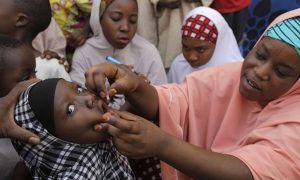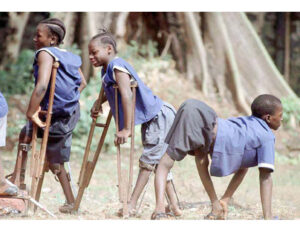Photo: WHO
Immunisation is essential for a healthy life as it offers protection from diseases that could last up to a life time. However, many Nigerians do not complete their vaccine doses, Jumoke Olasunkanmi writes, thereby putting them at health risks.
Despite the fact that infant immunisations have proven to be beneficial in preventing vaccine-preventable diseases (VPDs), a disturbing trend is emerging in Nigeria. More than 3 million Nigerian children are still unvaccinated or do not finish their recommended regular vaccination regimen, according to the latest figures from the World Health Organisation (WHO) and United Nations Children’s Fund (UNICEF).
According to the Paediatric Association of Nigeria (PAN), a vaccine is any preparation which when administered, is able to stimulate the immune system to produce specific responses that inactivate, destroys, or suppresses a given pathogen (microorganism). This means that vaccination is the administration of a vaccine for the prevention of disease while immunisation is the process of inducing immunity artificially. It added that these two words are used interchangeably because vaccination leads to immunisation.

Vaccination uses the concept of immunity by introducing materials that will induce immune response without causing disease and when an individual subsequently encounters the organism, he/she is able to mount an effective immune response to get rid of the organism without suffering the disease.
As vital tools for safeguarding the health of children, PAN recommends complete vaccination of every child born in Nigeria and those immigrating into Nigeria. The vaccine schedules are recommended by experts in PAN, in collaboration with others in UNICEF and the WHO. They protect them from diseases such as measles, polio, hepatitis, diphtheria, pneumonia and tuberculosis.
But despite this, many Nigerian families fail to take advantage of this life saving technology, putting their children at risk. In Abuja, 6.2 million children missed at least one dose of their routine immunisation in the last four years, according to the WHO’s 2023 report. The same applies around the country, children are getting insufficient immunisation.
Africa Health Report (AHR) visited the Abuja Municipal Area Council (AMAC) primary health facility in Lugbe, Abuja, to speak with mothers who were on appointment for immunisation of their babies.

“My first daughter was vaccinated from birth till 12 months. I could not keep up with subsequent appointments because of work and clinics don’t open on Saturdays,” a mother of two, Mrs. Udoh, told AHR when asked if she followed the full immunisation schedule for her first child.
She added that she stopped going to the clinic for immunisation when her first child was 12 months old because clinic appointments are difficult for working-class moms to attend since they are closed on weekends.
”She’s a healthy child and I believe she’s fully covered because she takes the booster vaccine that they bring to her school from time to time,” Mrs Udoh added.
Two other mothers our correspondent spoke with also disclosed that they did not give their children all vaccines they were supposed to have taken. Mrs. Gloria Bassey and Mrs. Otukpo said that in their opinion, children older than one year may do without more vaccinations, as only new-borns and babies are more in need of crucial vaccinations.
“What is important is that my children take BCG and other vaccines when they are still small, the rest is just extra and they can take it at home,” Mrs Bassey explained.

“Immunisation is important but sometimes when you don’t have time, you can miss appointments or even forget. I did not bring my son for his 9 months appointment because I had to go to work. I have a new baby now and I own my shop so I will not miss his appointments,” Mrs Otupko said.
But other mothers, while chatting with AHR, said they will not miss their children’s immunisations for anything because of their knowledge of the protection their children get from vaccines. One of them, Mrs. Godswill, said: “There’s nothing I’m doing that will make me not come for my baby’s vaccine because there is nothing as important as his health. This is my third child and the older ones are fully vaccinated too.”
Mrs Ebenezer supported her statement, saying: “The vaccines are free. It is not every day and does not take time so there’s really no reason for any parent to forgo immunisation. It is not hard to take one day away from work or business to attend to your child’s health.”
What are potential risks of not being properly immunised?
Children who do not receive complete immunisation on time will be susceptible to various vaccine-preventable diseases such as hepatitis, tuberculosis, whooping cough, and diphtheria, according to UNICEF. It added that children are also susceptible to various other health problems; for example, when a child has measles, complications like diarrhoea, pneumonia, blindness, and malnutrition are common.
Also, unvaccinated people cause epidemics. When they fall sick, they spread the diseases to other people including their children, other family members, neighbours and colleagues.
Adults are the most common source of pertussis (whooping cough) infection in infants, says UNICEF, and it can be deadly for babies.
Adults can also contract and experience mild symptoms with fatal complications; for example, pregnant women who are infected with the rubella virus are at high risk of giving birth to children with various disorders known as congenital rubella syndrome (CRS). Pregnant women who contract the measles virus are at risk of experiencing a miscarriage.
Infectious disease cases among a vulnerable group could lead to a broader community outbreak. This is why the government still vaccinates children against polio. When more children miss their vaccination, diseases that have been in decline for many years could suddenly break out again. The ongoing diphtheria outbreak in Nigeria has been linked to unvaccinated children from years back.
Impact on Personal Finances and Public Health
Some diseases are expensive to cure, leaving a significant impact on individuals and their families. For example, diphtheria will require immediate treatment in a hospital that has the capacity to treat this disease and its complications. The patient is placed in an isolation room and requires special drugs. An average measles illness can last up to 15 days, typically with five or six missed work or school days. Adults who get hepatitis lose an average of one month of work. In the case of a baby born with CRS, they will require lifelong treatment and high-cost medical aid and therapy.

Vaccines preventable diseases could lead to lifelong disability. For example, measles could lead to blindness. This has economic implications as the victim may never be able to generate income anymore. Incomplete vaccination contributes to a decrease in life expectancy, while complete vaccination among toddlers influences the increase in life expectancy. Data showed that those children who do not receive complete immunisation as a child are more likely to contract various other diseases and therefore experience decreased life expectancy.
Data from UNICEF shows that in West Papua, life expectancy increased from 2010 to 2017 with significant contribution from an increasing number of fully immunised children. It added that between 1940 and 1998, life expectancy at birth in Brazil increased by around 30 years, mainly due to the reduction of deaths due to vaccine-preventable infectious diseases. The vaccination of children, which reduced not only cases of illness but also the circulation of infectious agents among the population, positively impacted the health of adults and the elderly (collective protection).
There’s Need for More Enlightenment on Benefit of Immunisation – Experts
In reaction to this trend, Dr. Chidozie .P. Mpamah, a general physician, in an interview with AHR, noted that parents people do not finish their children’s immunisation cycle are unaware of the advantages of full vaccination and hence, subject them to health issues including polio, cholera and measles.

“Many parents are inadequately educated as regards the benefits of having to vaccinate their child according to the National Immunisation Schedule. Incomplete immunisation predisposes a child to health problems preventable by vaccines such as polio, cholera, diarrhea, measles, chickenpox, and so on,” he said.
Ezezobor Opeyemi, a nurse at Primary Health Centre, Bayeku, in Lagos, highlighted that the Nigerian government’s door-to-door vaccination outreach is an efficient method to ensure that every Nigerian child is properly immunised even if they stop visiting the clinic.

She said: “Majority complete their immunisation because of the outreach programmes the government provides. So even if they plan on stopping midway, the door-to-door programme serves as a means for them to complete their immunisation schedule.”
Another way the government can ensure parents complete their children’s vaccination is by enforcing ‘complete immunisation status’ requirement as one of the admission criteria to ensure all children and school residents are protected from vaccine-preventable diseases.


